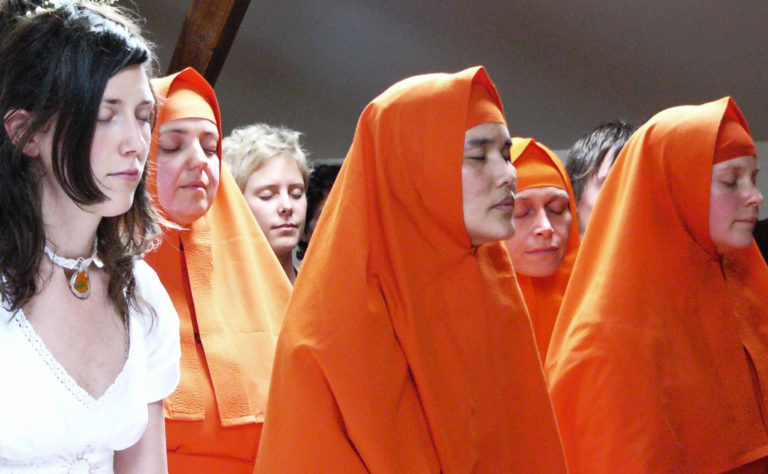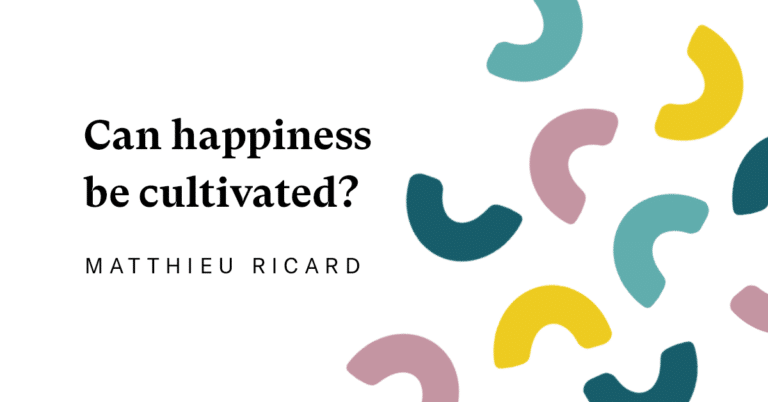
Image by Premasagar Rose/Flickr, Attribution-NonCommercial.
Exploring Lovingkindness in the Lab and in the Heart
David DeSteno, psychology professor at Northeastern University, recently had an article in The Atlantic about some of his meditation research, and the role mindfulness might play in developing compassion.
I got so happy reading it. In our utilitarian time, we tend to hear about meditation as a means to increase focus, emotional regulation, the functions of our immune system, perspective taking, clearer cognition, and productivity (a word I find somewhat clinical or cold). In a lifetime of teaching meditation, I’ve come to believe that all of that and more is true, transformative, and attainable. It’s the “and more” where I’ve put much of my life’s work.
Meditation, as David DeSteno writes, “has lately been promoted for its abilities to enhance the brain and heal the body, but many of its most experienced teachers argue that its fundamental purpose involves the soul.”
In addition to the benefits listed above, in countries like India or Burma or Tibet, where meditation practice is more widespread, practitioners are counseled to look for qualities like kindness and compassion as the metrics of whether their practice is proving effective or not. And, as I was taught in each of those places, look not towards your formal period of practice — your retreat experience, or the time you might put into meditation each day, however long or short — look to your everyday life to see signs of the possible efficacy of the practice: How are you with yourself when you’ve made a mistake? How attentive are you when meeting a stranger? How rigidly do you categorize people, and then cease to pay attention to them altogether? How might you be creating an “other” that you then discount or disdain?
I’ve often mused that in the West we are sometimes taught to think of kindness as something like a secondary virtue. The hidden message is, “Well, if you can’t be brilliant, or you can’t be courageous and wonderful, ok, be kind.” “It’s nice. It’s not of greatness, but it’s a good thing.”
Yet I believe that if we were to ponder times someone has been kind to us, they’ve seen some potential in us perhaps we couldn’t see. Or they’ve compassionately stayed the course with us in times of turmoil or adversity, so that we didn’t feel so alone or cast aside. We don’t think of the people who have helped us with disdain, or pity, “Wow, I really fooled them. There’s a loser.”
Our hearts are filled with gratitude and wonder. At times, no one of us might be all that easy to hang in there with. We’re very lucky if someone did. We’re very lucky if someone noticed us when others were, sometimes determinedly, looking the other way. We’re very lucky if someone put aside the normal self-preoccupation we are busy with to care about us. We actually hold that person in very high regard, not as a victim of a con act of ours.
It’s powerful to think of compassion and kindness as primary strengths developed through meditation. In times like these, with terrible pain abounding (as someone put up on Twitter, “Time since last mass shooting in America — 0 days”) I’ve heard a lot of concern about meditation leading people to be quietistic, more complacent, “accepting things as they are” in a dumbed down kind of way. In response I’ve said I think of meditation practice as fostering strength and resilience, not passivity.
Dr. DeSteno’s study invited participants to complete an eight-week training in meditation after which they were asked to come to the lab to examine their interpersonal behaviors. Sitting in a staged waiting room with three chairs were two actors. With one empty chair left, the participant sat down and waited to be called. Another actor using crutches and appearing to be in great physical pain, would then enter the room. As she did, the actors in the chair would ignore her by fiddling with their phones or opening a book. The question being tested was whether the subjects who took part in the meditation classes would be more likely to come to the aid of the person in pain, even in the face of everyone else ignoring her.
Among the non-meditating participants, only about 15 percent of people acted to help. But among the participants who were in the meditation sessions “we were able to boost that up to 50 percent,” said DeSteno. “The truly surprising aspect of this finding is that meditation made people willing to act virtuous — to help another who was suffering — even in the face of a norm not to do so,” DeSteno said. “The fact that the other actors were ignoring the pain creates as ‘bystander-effect’ that normally tends to reduce helping. People often wonder ‘Why should I help someone if no one else is?’”
Our conditioned tendency is to look at other people around us and recognize them as “other,” fundamentally different than us, and therefore separate. As a result, we find ourselves objectifying particular individuals or entire groups of people — either with antipathy, prejudice, or even just indifference. Our culture perpetuates a dualistic worldview of self and other. Mindfulness and other meditation practices can open up our world.
I look forward to more and more research on some of these other practices, such as lovingkindness meditation, as well as ongoing research into the effects of mindfulness. Lovingkindness meditation is a technique that is particularly designed to cultivate greater connectedness, care about ourselves and others, inclusiveness, and compassion. We practice flexibility of attention doing it — opening to those we might normally ignore, looking at the good within us not only fixating on the mistakes we’ve made, dissolving some of the walls we’ve put up between ourselves and others that keep us more lonely and afraid. Each type of meditation — mindfulness and lovingkindness — is worth exploring, both in the lab and in one’s heart.

